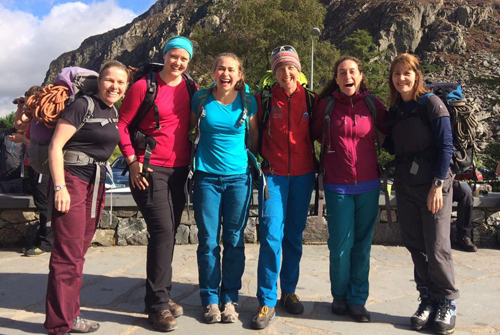MIA mentoring - progress report
“Mentoring allows us to accurately evaluate our skills, to see our blind spots and to determine a plan for improvement. And isn’t that a worthy goal for both our professional and our personal endeavors?”
Ron Culberson, Huffington Post blog article
You may or may not know that this summer Mountain Training UK has been piloting a mentoring scheme for the Mountaineering Instructor Award. Here’s a short update on how it came about, what happened and what’s going to happen next.
How it came about
Mentoring is an established mechanism to support people in their development across a wide range of activities, sports and professions. As part of our collaboration with other sports in our sector we’ve discussed the idea of ‘blended learning’ and the positive impact it can have. In fact we have just started a collaborative three year PhD research project with Bangor University looking at how we improve completion rates for all our candidates.
Mountain Training has, for the last 52 years, approved providers to run training and assessment courses. What happens before, between and after these courses is very much up to the candidate. We’ve started to consider ways to support them and mentoring and e-learning were the two options we were most interested in exploring first. (Information about our pilot e-learning modules will be available very soon.)
This year (2016) we decided to run a pilot mentoring scheme for female MIA trainees that would offer support during their run up to assessment and give us the opportunity to learn from the process. We chose this group for three reasons; there are disproportionately few female MIAs, there had already been convincing feedback from women that mentoring would be a welcome addition and lastly, we knew the numbers would be manageable and we wanted to start small.

What happened?
We contacted all the women who had attended MIA training in the last five years but not yet passed assessment (25 in total) offering them support in the form of phone calls or meetings to discuss their consolidation and assessment preparation plan, DLOG, or answer any specific questions. 12 of the trainees took up the offer in return for providing us with feedback and ideas for the future development of mentoring as a whole.
This coincided with AMI both establishing an Equality Working Group, and deciding to develop practical mentoring, which enabled us to team up with Sam Leary (an experienced MIC) as chair of the Working Group, who invited the trainees to observe her working and where appropriate they did some teaching and Sam offered them feedback.
All six females who passed their assessment this year were involved in mentoring in some way; four directly through our pilot and two through mentors of their own. Congratulations to all!
What happens next?
We are currently evaluating the pilot mentoring scheme, but in the meantime we are delighted to report a 100% success rate at assessment for the mentees – male and female. Sharing everything that we and they have learned will follow soon. The evaluation will also look at developing a model for mentoring that might work across all schemes. Any future mentoring schemes would be accessible to men and women.
The assessment process
Mountain Training UK is not a provider – we do not run any training or assessment courses ourselves. Mountaineering Instructor (Award and Certificate) courses are run by the three national centres; Glenmore Lodge, Plas y Brenin and Tollymore, and staffed by teams of highly experienced Mountaineering Instructor Certificate holders who have been trained and approved and are monitored to carry out this specialist role.
On a typical course every candidate will be assessed by between three and five different assessors. Every evening and at the end of the course, the whole assessment team plus the course director discuss every candidate in great detail to arrive at the most appropriate outcome. The robust nature of this system leads to fair and reliable results.
Our mentoring pilot has been, and any future mentoring scheme will be, separate from this assessment process. It is the combination of the awarding organisation (in this case Mountain Training UK), a membership association (in this case AMI), the training providers (in this case the three national centres and of course the candidate that leads to new instructors: its success is reliant above all things upon the effort and input of individual candidates and we want to find more ways to maximise their experience and gain our qualifications.